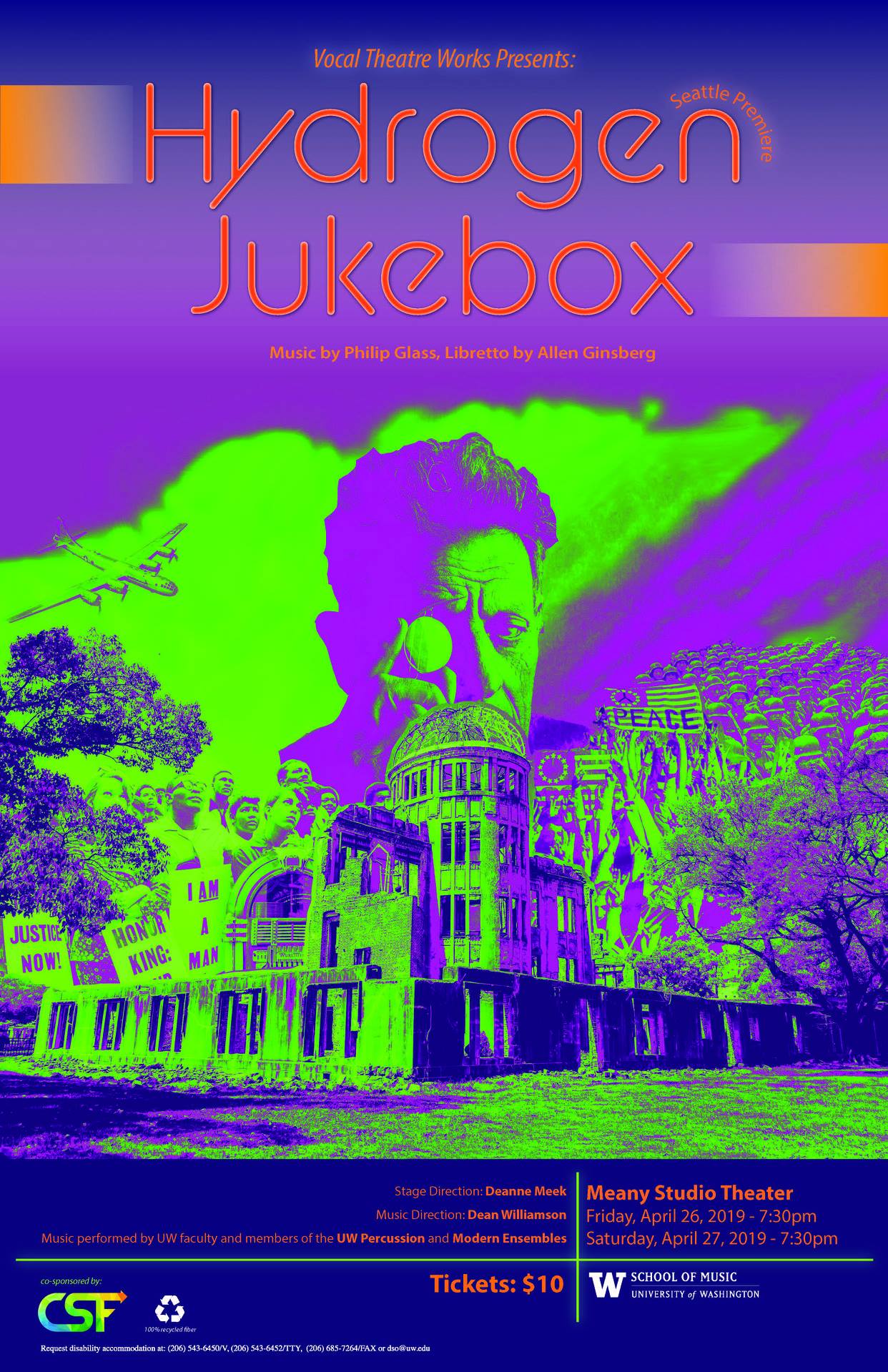Within the School of Music, students of the Vocal Performance department are studying and performing Phillip Glass’ modern opera Hydrogen Jukebox in April 2019. This music theatre piece features a setting of Allen Ginsberg’s poetry, and presents issues of social and environmental justice and sustainability that America has grappled with in recent decades. Hydrogen Jukebox treats themes of environmental degradation, social injustice, and war. We in the Vocal Theatre Works program are excited to engage with and present a work that promotes social and cultural awareness through diverse and interdisciplinary collaboration.
Like other forms of music theatre, vocal theatre is an interdisciplinary medium that draws on a variety of fields to create a cohesive piece of art. These include music, literature, dance, traditional theatre, and increasingly, science and technology. We believe that this uniquely inclusive medium is an ideal modality for students to apply their various academic and creative pursuits within the University. Our artform best uses resources when it engages a diverse segment of our academic peers at the University of Washington and the community at large.
During the 2017-2018 academic year, the vocal performance students produced Maurice Ravel’s L’enfant et les Sortilèges. In performing this work, our primary production goal was to build compassion and empathy within our community through performance. Colette’s libretto for L’enfant deals with the devastation left by the first World War and serves as a guide for the reparation of inter-community relationships shattered by carnage and hostility. Similarly, we believe we can bring greater awareness to issues of cultural and environmental sustainability by performing Glass’ Hydrogen Jukebox. Our performance of Hydrogen Jukebox, the work’s Seattle premiere, will highlight and promote discussion of the social struggles surrounding war, sexual liberation, and environmental degradation. Our performance will also enhance awareness of the works of Allen Ginsberg, an American poet who faced discrimination based on his sexual orientation. We believe that it is our responsibility to take a leadership role within the University by using the arts as a vehicle to engage our community in examining these important issues. American society has become increasingly divided over the past decades, and by highlighting messages of social responsibility and compassion, we engage our community with a model of cultural sustainability.
Visiting artist Deanne Meek and Professor Cyndia Sieden will serve as faculty mentors for this project. Our department has expressed robust support and enthusiasm for this project but is unable to allocate additional funds for this academic year. In addition to faculty support, we have procured the project management services of Jonathan Luk, who has served in roles as Director of Product and program management to assist in project management for this effort.
The students of Vocal Theatre Works request a Campus Sustainability Fund grant for our 2019 Hydrogen Jukebox production. We have already secured approximately $22,000 of our $30,000 budget and request your assistance in achieving our funding goal for this production. We will use the grant to bring respected leaders from the University and larger Seattle community to engage both the audience and students in discussion sessions. We will also invite these leaders into the Vocal Theatre Works production process to facilitate an analysis of Ginsberg’s poetry in the context of its musical setting in order to enhance interdisciplinary collaboration and its performance presentation. In addition, funds would be allocated towards general production costs, such as sets, costumes and projection equipment. A tentative budget is included with this letter of intent.
Points of Contact
Trevor Ainge, student development coordinator
aingetj@outlook.com | 206-698-4396
Deanne Meek, visiting artist
deannemeek@gmail.com
Budget
Vocal Theatre Works: Principal Production, 2019
Hydrogen Jukebox
Music by Philip Glass, Libretto by Allen Ginsberg
April 26 and 27, 2019 7:30 p.m. Meany Studio
|
VTW: Hydrogen Jukebox Estimated Expenses, 2019
|
Amount
|
|
Music Direction, Coaching and Conducting
|
$10,000
|
|
Stage Direction, Production Coordinator, Fundraising/Development Associate
|
$10,000
|
|
Music licensing and parts rental
|
$1,050
|
|
Sets and Costumes
|
$1,000
|
|
Choreography
|
$500
|
|
Musical scores copy fees
|
$300
|
|
Sound equipment, microphones
|
$1,000
|
|
Development: Receptions, Piano tuning
|
$400
|
|
Pre-Post Performance Talk Backs or Panel Discussions
|
$2,000
|
|
Projector and Projection costs/Design
|
$3,000
|
|
Miscellaneous
|
$750
|
|
Total Estimated Expenses:
|
$30,000
|
To date, approximately $22,000 has been raised to be designated for this project, with funding initiatives still in progress.
Budget created by Deanne Meek, updated November, 2018
